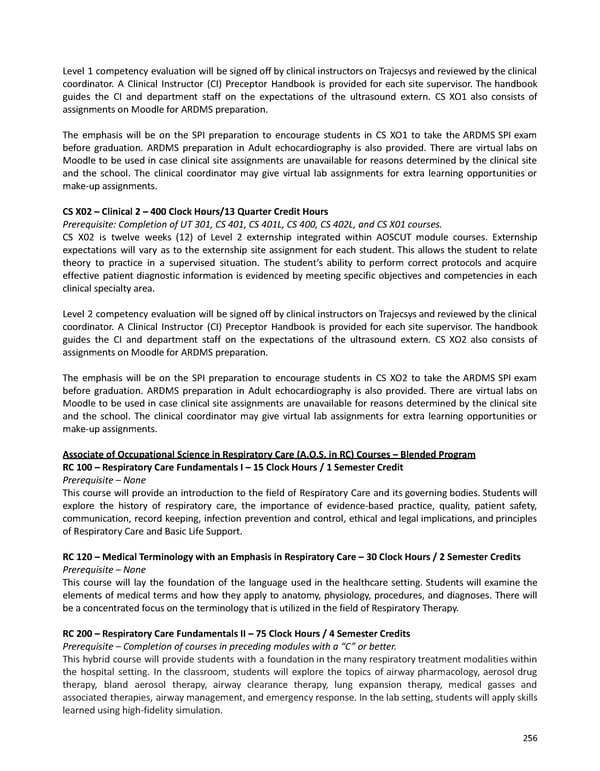Level 1 competency evaluation will be signed off by clinical instructors on Trajecsys and reviewed by the clinical coordinator. A Clinical Instructor (CI) Preceptor Handbook is provided for each site supervisor. The handbook guides the CI and department staff on the expectations of the ultrasound extern. CS XO1 also consists of assignmentsonMoodleforARDMSpreparation. The emphasis will be on the SPI preparation to encourage students in CS XO1 to take the ARDMS SPI exam before graduation. ARDMS preparation in Adult echocardiography is also provided. There are virtual labs on Moodle to be used in case clinical site assignments are unavailable for reasons determined by the clinical site and the school. The clinical coordinator may give virtual lab assignments for extra learning opportunities or make-upassignments. CSX02–Clinical2–400ClockHours/13QuarterCreditHours Prerequisite: Completion of UT 301, CS 401, CS 401L, CS 400, CS 402L, and CS X01 courses. CS X02 is twelve weeks (12) of Level 2 externship integrated within AOSCUT module courses. Externship expectations will vary as to the externship site assignment for each student. This allows the student to relate theory to practice in a supervised situation. The student’s ability to perform correct protocols and acquire effective patient diagnostic information is evidenced by meeting specific objectives and competencies in each clinical specialty area. Level 2 competency evaluation will be signed off by clinical instructors on Trajecsys and reviewed by the clinical coordinator. A Clinical Instructor (CI) Preceptor Handbook is provided for each site supervisor. The handbook guides the CI and department staff on the expectations of the ultrasound extern. CS XO2 also consists of assignmentsonMoodleforARDMSpreparation. The emphasis will be on the SPI preparation to encourage students in CS XO2 to take the ARDMS SPI exam before graduation. ARDMS preparation in Adult echocardiography is also provided. There are virtual labs on Moodle to be used in case clinical site assignments are unavailable for reasons determined by the clinical site and the school. The clinical coordinator may give virtual lab assignments for extra learning opportunities or make-upassignments. Associate of Occupational Science in Respiratory Care (A.O.S. in RC) Courses – Blended Program RC100–RespiratoryCareFundamentalsI–15ClockHours/1SemesterCredit Prerequisite – None This course will provide an introduction to the field of Respiratory Care and its governing bodies. Students will explore the history of respiratory care, the importance of evidence-based practice, quality, patient safety, communication, record keeping, infection prevention and control, ethical and legal implications, and principles of Respiratory Care and Basic Life Support. RC120–MedicalTerminologywithanEmphasisinRespiratoryCare–30ClockHours/2SemesterCredits Prerequisite – None This course will lay the foundation of the language used in the healthcare setting. Students will examine the elements of medical terms and how they apply to anatomy, physiology, procedures, and diagnoses. There will beaconcentratedfocusontheterminologythatisutilizedinthefieldofRespiratoryTherapy. RC200–RespiratoryCareFundamentalsII–75ClockHours/4SemesterCredits Prerequisite – Completion of courses in preceding modules with a “C” or better. This hybrid course will provide students with a foundation in the many respiratory treatment modalities within the hospital setting. In the classroom, students will explore the topics of airway pharmacology, aerosol drug therapy, bland aerosol therapy, airway clearance therapy, lung expansion therapy, medical gasses and associated therapies, airway management, and emergency response. In the lab setting, students will apply skills learned using high-fidelity simulation. 256
 2023-2024 | Catalog Page 255 Page 257
2023-2024 | Catalog Page 255 Page 257